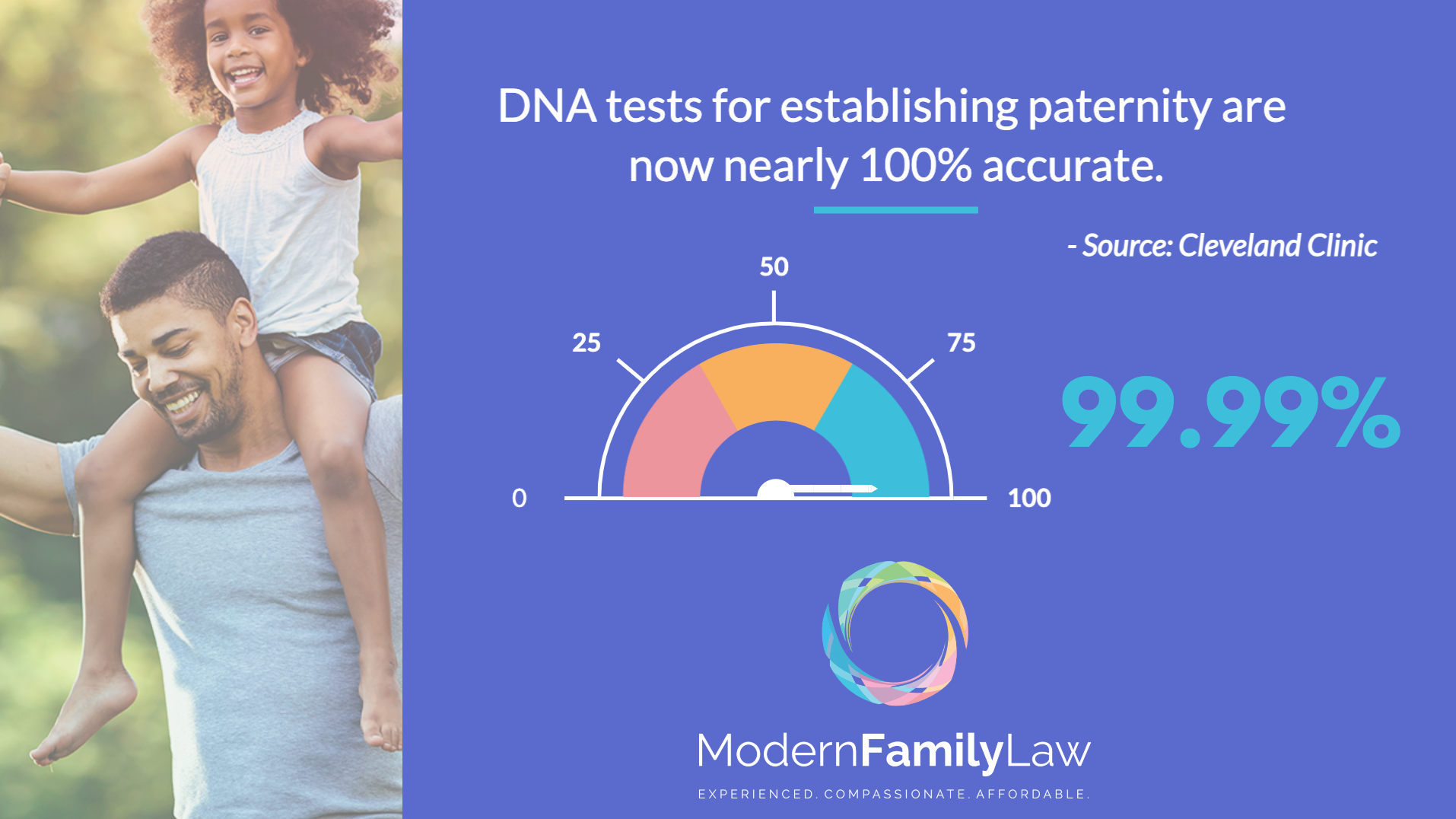PATERNITY ATTORNEYS
IN COLORADO
Modern Family Law's compassionate Colorado paternity lawyers specialize in issues related to the establishment and enforcement of paternity rights and responsibilities. Our lawyers assist clients in cases involving the determination of a child's legal father, as well as issues related to child support, parenting time and decision-making responsibilities.
All of our attorneys are knowledgeable in the Colorado's paternity laws and regulations and are able to provide guidance and representation for individuals in a variety of paternity-related legal matters. Whether you are a father seeking to establish your legal rights to your child or a mother seeking to establish the paternity of your child, we are here for you. Learn about all aspects of paternity in Colorado below including:

Our experienced Colorado paternity attorneys understand that no case is the same. We encourage you to reach out and share the details of your case with them so they can provide you with the guidance you need. Our Colorado paternity lawyers can help ensure that your rights and the best interests of your child are protected. Contact us today!
WHAT IS
PATERNITY IN COLORADO?
Paternity refers to the legal relationship between a father and his child. It establishes the identity of the child's biological father and grants the father legal rights and responsibilities for the child. Paternity can be established through a legal process, such as a court order or through the signing of a voluntary acknowledgment of paternity.
Once paternity is established, the father may have the right to seek parenting time and decision-making responsibilities, as well as be responsible for providing child support. Paternity establishment is important as it gives the child a sense of identity, access to medical and family history, and legal rights to inheritance, social security and veterans benefits.
Learn about the important distinction between Paternity and Allocation of Parental Responsibilities

WHAT IS THE COURT PROCESS FOR
ESTABLISHING PATERNITY IN COLORADO
In Colorado, parents can legally establish paternity by signing a "Voluntary Acknowledgment of Paternity" (VAP) form, provided they both agree on the identity of the father. This form, once signed, legally recognizes the alleged father as the legal father of the child, and the father's name can be added to the child's birth certificate. However, once 60 days have passed since the signing of the acknowledgement, neither parent can revoke or rescind the acknowledgement without court intervention.
In the event that the parents do not agree on the paternity of a child, a court action must be initiated to establish it. Colorado law allows several parties to initiate the legal process, which includes:
- The child, represented by a personal representative if under the age of 18
- The child’s mother
- The man who believes he is the father or has been identified as such (putative father)
- The Colorado Department of Legal Services
- The Social Services department in the county where the child resides
In Colorado, the district court system has jurisdiction over paternity cases, with one district court covering multiple counties. The appropriate court to file the case would be the district court in the county where the child or putative father reside or where public benefits are being provided for the child.
It is important to note that title 19 of the Colorado Revised Statutes outlines when a man is presumed to be the natural father of a child and thus doesn't not need to pursue a paternity case. Colo. Rev. Stat. §19-4-105 states:
“A man is presumed to be the natural father of a child if he and the child’s natural mother are or have been married to each other and the child is born during the marriage, within three hundred days after the marriage terminated by death, annulmnet, declaration of invalidity of marriage, dissolution of marriage, or divorce.”
Anyone with questions should speak to an attorney to verify the right course of action in a paternity case.
WHAT ARE THE BENEFITS OF
ESTABLISHING PATERNITY IN COLORADO?
Establishing paternity in Colorado provides a number of benefits for both the father and the child. Some of these benefits include:
- Legal Recognition: Establishing paternity legally recognizes the father as the legal parent of the child, giving him certain rights and responsibilities, such as the right to seek custody or visitation, and the responsibility to financially support the child.
- Medical Information: Knowing and having access to the father’s medical history can be important for the child’s health, as certain medical conditions or genetic disorders may be inherited.


- Emotional Benefits: Establishing paternity can provide the child with a sense of identity and connection to their father and his family.
- Access to Benefits: The child may be eligible for certain benefits, such as social security, veterans’ benefits, or life insurance if the father is listed on the birth certificate.
- Closure: Establishing paternity can also provide closure for both the father and the child, by officially acknowledging their relationship and resolving any doubts or uncertainty.
IS THERE A TIME LIMIT FOR
ESTABLISHING PATERNITY IN COLORADO?
In Colorado, there is no specific timeframe within which paternity needs to be established. However, if the parents are unmarried, paternity can be established at any time before the child turns 18. It's important to note that if child support or custody is an issue, it's best to establish paternity as soon as possible. If the parents are married, paternity is typically presumed to be with the child's legal father and can only be challenged within certain time limits.

A man can contest paternity if he believes he is not the biological father of a child. This can be done by filing a petition to disestablish paternity with the court. The court will then order genetic testing to determine the biological father. If the results show that the man is not the biological father, the court will terminate his legal paternity and any legal rights and responsibilities associated with it.
A child has the right to bring a paternity action in Colorado to determining their biological father. A child has until they are 21 years of age to bring a paternity action in Colorado.

The court will then order genetic testing to determine the biological father. Once the father is established, the court will then enter an order of paternity, which establishes the legal rights and responsibilities of the father, such as child support, visitation, and legal decision-making authority. It's important to note that the process of bringing a paternity action can be complex, and it is recommended that a child or their legal guardian consult with an attorney to understand their rights and the legal process involved.
WHAT OUR CLIENTS SAY ABOUT OUR
EXPERIENCED PATERNITY LAWYERS IN COLORADO
I only ended up choosing another attorney to go with because of some very specific nuances of my case. However, before I went with that attorney, Grace was at the Top of my List! I highly recommend her and Modern Family Law Firm. They consulted the extreme vulnerability of my situation so delicately and with the utmost professionalism, and I thank them for their consideration and time 🙂
I only ended up choosing another attorney to go with because of some very specific nuances of my case. However, before I went with that attorney, Grace was at the Top of my List! I highly recommend her and Modern Family Law Firm. They consulted the extreme vulnerability of my situation so delicately and with the utmost professionalism, and I thank them for their consideration and time 🙂
I would recommend her to anyone. 5 stars all around. Thank you!!!!
I would recommend her to anyone. 5 stars all around. Thank you!!!!
FREQUENTLY ASKED QUESTIONS ABOUT
PATERNITY IN COLORADO
Can A Man Request A Paternity Test In Colorado Even If The Mother Doesn't Want It?
In Colorado, a man can request a paternity test, even if the mother does not want it. He can do this by filing a petition to establish paternity with the court. The court will then order genetic testing to determine if the man is the biological father of the child.
How Much Does It Cost To Establish Paternity In Colorado?
The cost of filing a petition to establish paternity in Colorado is $20. Then a DNA test will need to be completed which can range in cost from $90 to $250.
What Are Paternity DNA Tests?
Paternity DNA tests are scientific tests that are used to determine the biological relationship between a man and a child. These tests use DNA analysis to compare the genetic material of the alleged father and the child to determine if they share a biological relationship. The most commonly used method of paternity DNA testing is the analysis of specific regions of the DNA called short tandem repeats (STRs), which are inherited from both parents.
The DNA samples are collected from the alleged father, the child, and sometimes from the mother as well, and are analyzed by a laboratory. The results of the test are usually presented in the form of a probability of paternity, which indicates the likelihood that the alleged father is the biological father of the child. Paternity DNA tests are considered to be very accurate, with a typical accuracy rate of over 99%.
OUR COLORADO CHILD CUSTODY LOCATIONS
COLORADO SPRINGS
CHILD CUSTODY LAWYERS
9362 Grand Cordera Pkwy Suite 205,
Colorado Springs, CO 80924
FORT COLLINS
CHILD CUSTODY LAWYERS
3711 John F Kennedy Pkwy Suite 225,
Fort Collins, CO 80525
(970) 410-8241
OUR COLORADO FAMILY LAWYERS
ARE READY TO LISTEN!
Our experienced family law attorneys in Colorado
work to establish paternity and build bonds between children and their fathers.
Reach out today to and let our experienced attorneys stand up for your rights.
Schedule A FREE
Consultation
